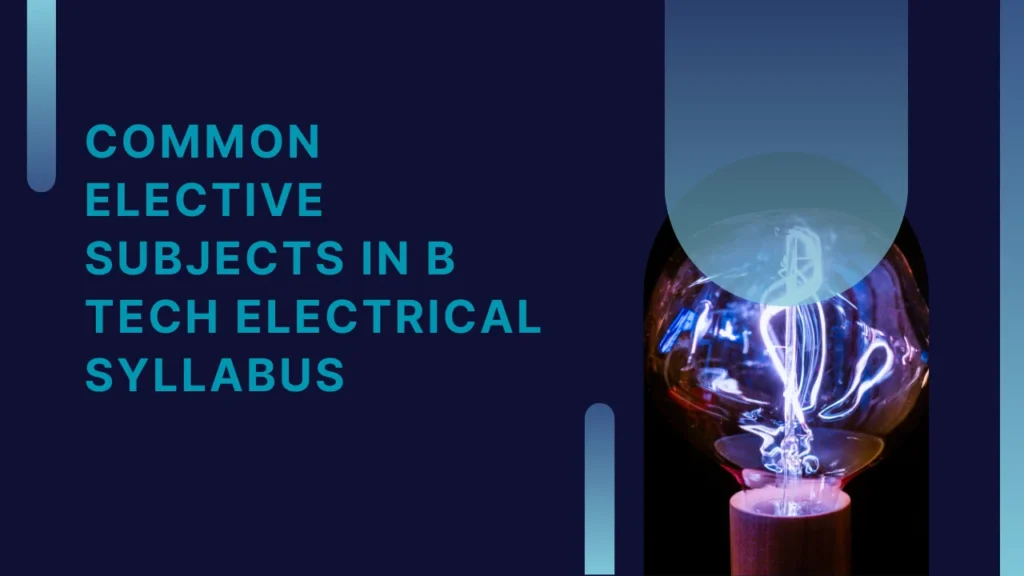If you plan to study electrical engineering, knowing the B Tech Electrical syllabus is very important. This four-year course helps students understand everything from basic electrical concepts to advanced systems. It includes theory, practicals, and projects, all designed to prepare students for real-world challenges.
Each semester in this course builds on the last. Students learn math, science, and core electrical topics. They also gain skills in software, machines, and systems. Let’s explore what you’ll study in this course from the first year to the final semester.
Read More About Tech and Health at Aiotechnical.com
What is the B Tech Electrical Syllabus?
The B Tech Electrical syllabus is a structured study plan for students who want to become electrical engineers. It teaches the generation, transmission, and use of electricity. The syllabus includes subjects like circuits, machines, control systems, and power electronics.
This course is divided into eight semesters. In each semester, students study theory, do lab work, and complete mini or major projects. This system helps them learn both basic and advanced concepts.
Also Read: Reliable Tech Park: A Hub for Businesses in Navi Mumbai
First Year: Building the Basics
In the first year, students study common subjects for all engineering branches. These include physics, chemistry, and basic electrical knowledge. They also learn mathematics and basic programming.
Semester 1 and Semester 2 focus on science and technical subjects. These build a foundation for electrical engineering topics in later years.
| Semester | Subjects Covered |
|---|---|
| 1 | Engineering Mathematics-I, Physics, BEE, Programming |
| 2 | Engineering Mathematics-II, Chemistry, Mechanics, Communication |
During this year, students understand how math and science apply to engineering. This helps them in future semesters when topics become more advanced.
Second Year: Entering Core Electrical Topics
The second year introduces students to core electrical topics. They start with circuit theory, machines, and signal systems. Students also study electronics and digital systems.
One of the key subjects is Network Theory, which teaches how current flows through circuits. Another is Electrical Machines, which explains how motors and generators work.
| Semester | Subjects Included |
|---|---|
| 3 | Network Theory, Electrical Machines-I, Math-III |
| 4 | Digital Electronics, Electrical Machines-II, Signals & Systems |
Students also attend labs where they practice what they learn. They build circuits, use machines, and test systems. This hands-on learning is a key part of this Electrical syllabus.
Third Year: Studying Systems and Applications
In the third year, the syllabus becomes more advanced. Students now learn about power systems, control systems, and microcontrollers. These are the systems that run machines and electronics in real life.
Power Electronics is a subject that deals with converting and controlling electric power. It is useful in industries and transport. Students also study Control Systems, which are used in factories and smart devices.
| Semester | Subjects You Study |
|---|---|
| 5 | Power Electronics, Control Systems, Microprocessors |
| 6 | Electrical Drives, Embedded Systems, Power Systems |
This year also includes a mini project. Students apply everything they’ve learned to solve a real-world problem. It builds teamwork and problem-solving skills.
Also Read: Global Village Tech Park: A Thriving IT Hub in Bengaluru
Fourth Year: Specialization and Project Work
In the final year, students choose elective subjects based on their interest. They can focus on areas like electric vehicles, smart grids, or renewable energy. These electives make this Electrical syllabus flexible and future-ready.
The final year also includes a major project. Students work in groups to build or design a working system. Some colleges even help students do internships in industries.
| Semester | Main Focus Areas |
|---|---|
| 7 | Electives, High Voltage Engineering, Project Phase I |
| 8 | Smart Grid, Electives-II, Project Phase II |
This project is important for students. It shows what they have learned during the course and gives them experience for jobs.
Common Elective Subjects in B Tech Electrical Syllabus

Students can choose electives based on their career goals. Here are some common options:
| Field | Elective Subjects |
|---|---|
| Renewable Energy | Solar Energy, Wind Energy |
| Electric Vehicles | EV Technology, Battery Systems |
| Power Systems | Smart Grids, FACTS |
| Control and Automation | Advanced Robotics, AI in Control Systems |
Electives help students gain expert knowledge in a growing field. They also improve job opportunities after graduation.
Labs in B Tech Electrical Engineering
Lab sessions are important in every semester. They help students apply theory to real situations. Each core subject has a related lab.
Here are the common labs you’ll attend during the course:
- Basic Electrical Lab
- Machines Lab
- Electronics Lab
- Power Systems Lab
- Microprocessor Lab
- Measurement & Instrumentation Lab
These labs develop hands-on skills, which are highly valued by companies. This Electrical syllabus ensures students are not just book-smart but industry-ready.
Career Options After B Tech Electrical Engineering
This Electrical syllabus opens doors to many careers. Students can work in private firms, public companies, or even research labs. Some go for higher studies or competitive exams.
Common job roles include:
| Job Title | Where You Work |
|---|---|
| Electrical Engineer | Power plants, utility companies |
| Design Engineer | Electronics manufacturing firms |
| Maintenance Engineer | Industrial plants, factories |
| Embedded Developer | IT and automation companies |
| Control Engineer | Robotics, automation systems |
Many students also appear for GATE, IES, or PSU exams. A good score can get them into top government jobs or postgraduate studies.
Higher Studies After Graduation
After finishing B Tech, some students choose to study further. The most common options are:
- M.Tech in Electrical or Power Systems
- MBA in Energy Management or Operations
- Postgraduate Diploma in Embedded Systems
These programs help students specialize or shift into management. This Electrical syllabus gives them a strong base for any path they choose.
How the B Tech Electrical Syllabus Prepares You for Industry Jobs
It is carefully designed to do more than just teach theories. It equips students with skills, knowledge, and practical experience needed for real-world electrical engineering jobs. From the first semester to the final year, the subjects, labs, and projects focus on industry needs. Let’s explore how this syllabus prepares you to take on the challenges of the professional world.
Strong Foundation in Engineering Principles
The journey starts with core subjects in mathematics, physics, and programming. These build analytical thinking and problem-solving skills. Students learn how to apply math to real-life circuits and how physics explains the flow of electricity. Programming in C or Python trains students in logic, which is essential in automation and control jobs.
This strong base is important in every electrical engineering role. Whether you design circuits or test power systems, these skills guide every step.
Hands-On Lab Work That Builds Confidence
Every subject in the syllabus is matched with a related lab. Students do experiments, test machines, build circuits, and use software tools. These labs help students understand how real systems work and prepare them to handle actual equipment.
For example, the Electrical Machines Lab allows students to test motors and transformers. The Power Electronics Lab helps them work with converters and controllers. This experience gives them confidence when entering the job market.
Industry-Relevant Electives and Skills
In the final year, students choose electives like Electric Vehicle Technology, Smart Grids, and Renewable Energy Systems. These subjects reflect the latest trends in the industry. They help students specialize in areas that are growing in demand.
For example, if a student takes an elective in renewable energy, they are better prepared for jobs in solar or wind energy companies. If they choose embedded systems, they can apply for roles in IoT or smart device development.
What Skills Do Students Gain?
By completing this degree, students gain both soft and technical skills. They learn how to design, test, and maintain electrical systems. They also learn teamwork, communication, and problem-solving.
Key skills developed include:
- Understanding of machines and power systems
- Ability to read and design circuit diagrams
- Programming knowledge in embedded systems
- Use of modern electrical tools and software
These skills help students in jobs, exams, and even if they start their own business. The course shapes them into complete professionals.
Why Choose B Tech in Electrical Engineering?
Electrical engineering is always in demand. From power grids to smartphones, everything runs on electricity. This course makes students ready for industries that power the world.
The syllabus also changes with time. It includes modern topics like IoT, electric vehicles, and green energy. This keeps students updated and job-ready.
Some reasons to choose this field include:
- High demand for skilled electrical engineers
- Jobs in both public and private sectors
- Good pay and career growth
- Opportunities for innovation and research
This Electrical syllabus balances tradition and technology. It teaches the past, present, and future of electrical systems.
Also Read: B.Tech Food Technology: Course and Career Opportunities
Final Thoughts
The B Tech Electrical syllabus is not just a list of subjects. It is a carefully planned course to shape skilled and smart engineers. From basics to advanced systems, from labs to projects, it covers every important aspect.
Students not only gain knowledge but also real-world experience. They learn how to solve problems, work in teams, and think like engineers. The course builds confidence and opens many career paths.
If you want to work with machines, solve energy problems, or build the future of technology, this course is the right choice.



